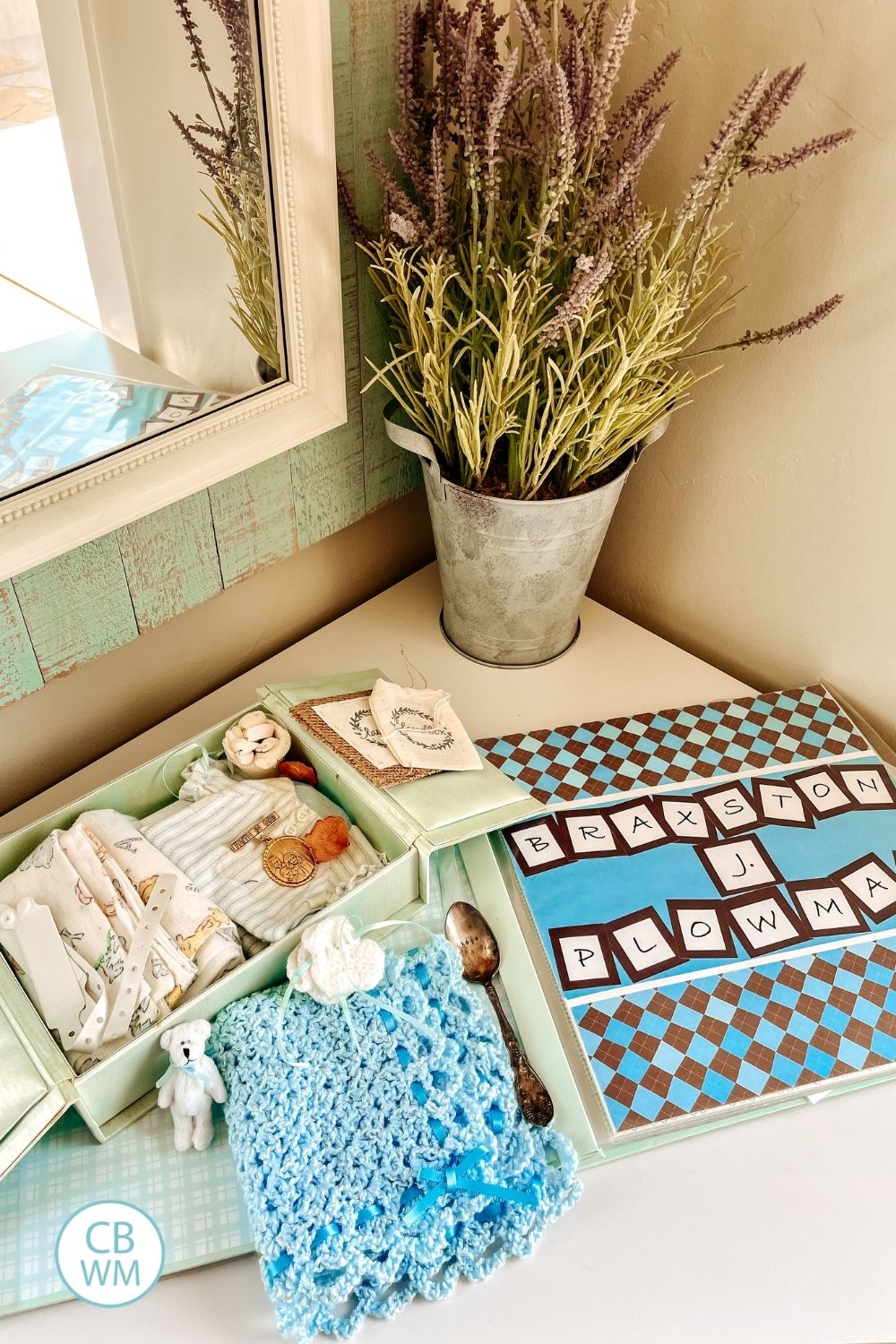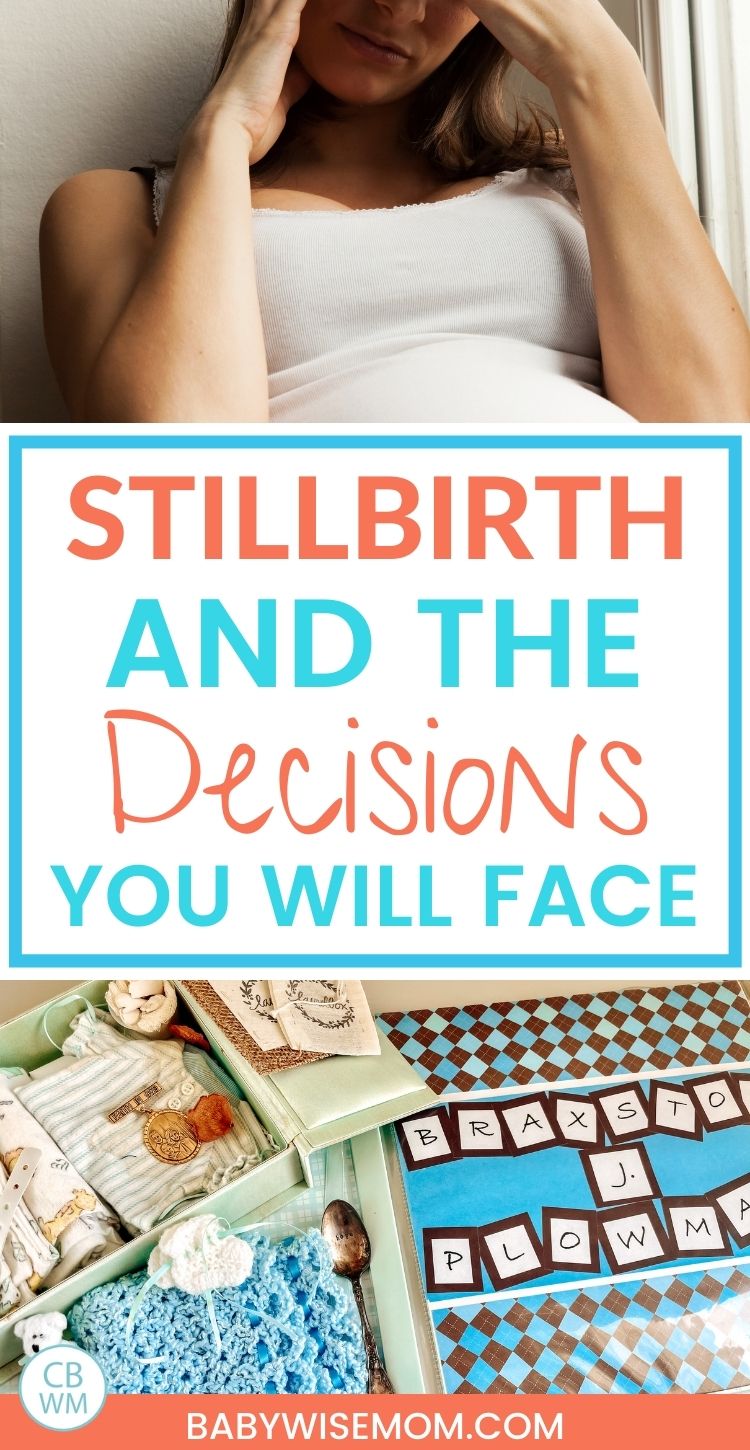When parents find out they have lost their baby, there are many decisions that need to be made quickly. Learn what to expect so you can decide what is best for your family.

Today marks 15 years since I delivered a stillborn baby boy.
The other day I was sharing the story with some friends and one asked me where he was buried.
I paused and replied, “That is actually a regret I have in life.”
He was cremated. At the hospital, they told me that is what people do. I had never thought about what I would do if I lost a baby. I was numb. I just did what they told me I should do.
And I wish I hadn’t.
It got me thinking about the whole process and decisions you have to make essentially while moving through a fog. It is hard to make informed decisions while processing the death of your child.
I hope this post will help you get through those decisions in a way that will not leave you with regret.
Read all about our experience in losing Braxston here.
Post Contents
Stillbirth Definition
A stillbirth is the loss of a baby before the baby is born or during delivery. A stillbirth is the loss of a baby after 20 weeks of pregnancy, while a miscarriage is the loss of a baby before 20 weeks gestation.
Stillbirth Statistics
According to the CDC, 1 in 160 births are stillbirths. That means about 24,000 stillborn babies are delivered in the United States each year.
This number might surprise you if you have never had a stillborn baby. Once you have and others know it, then people come out of the woodwork to share with you that they know what you are going through.
Causes and Risk Factors
One of the first things I wanted to know when I found my baby had passed away was “why.” Essentially, I wanted to know if it was my fault.
I think most every mother would wonder that.
>>>Read: Your Infant Loss Was Not Your Fault
Many stillbirths are unexplained with an unknown cause.
Sometimes a stillbirth happens because of birth defects.
There are risk factors that they find more people have stillbirths if they fall into those categories. They include race (black women experience more stillbirths), age, socioeconomics, smoking, alcohol use, high blood pressure, diabetes, obesity, multiples (twins or triplets), and history.
These things are not supposed to increase the risk of stillbirth, but they are present more commonly in pregnancy loss.
Decisions You Will Have to Make
Very few people have ever taken the time to think through what they would do if they lost their baby.
I certainly hadn’t.
The decisions that came our way in a short period of time were overwhelming to say the least.
I hadn’t processed what was happening. I hadn’t fully grasped the fact that I wasn’t going to have my baby.
Suddenly I was being asked all sorts of things I basically couldn’t comprehend.
Below are decisions you will have to face. Each decision is difficult and there is no one right or wrong answer. What I prefer might be the opposite of what you prefer. There is no “correct” here.
Delivery
Once you know that you have lost your baby, you will need to deliver your baby.
If your stillbirth is an early stillbirth, you might have the option of delivery or a D&C. Some doctors might offer that so you do not have to go through labor pains on top of the emotional pain of losing a baby.
I was offered that option but chose to deliver, and I am very happy I did that.
All of the same decisions that you need to make for any delivery apply here.
Who do you want in the room with you? Do you want music playing? How do you want to labor? Do you want a medicated or unmedicated birth?
Essentially you can make a birth plan for this. Unfortunately, you don’t have long to create it. Even if you already had one created, you might have different preferences now that the circumstances have drastically changed.
Your labor will need to be induced.
I was allowed the chance to go home from my appointment and pack a hospital bag and arrange for childcare for Brayden (who was 11 months old). I was able to put Brayden to bed and then go to the hospital.
So many of the actions you will take will cause so much emotional pain. You need a birth plan. You need a hospital bag. You will need postpartum recovery items.
All of these are things you have known you would need, but now you have to do it all without also getting your baby.
Pain Relief
Even though pain relief is part of the birth plan, I feel like it needs special attention.
I distinctly remember my nurse coming in the room and offering me pain relief and me turning it down. She smiled slightly and said, “Dr. Heiner said you would say that.”
There is no right or wrong here.
The reason I chose to deliver Braxston unmedicated (my only child I did so with) was because I wanted to feel all of the pain.
This wasn’t some martyr decision. I was keenly aware somehow through the fog that I would not have any more mortal experiences with him and I needed to deliver him naturally so I could at least experience that.
That was something I needed. You might need to be pain free physically so the emotion of it doesn’t all completely overwhelm you.
Holding and Seeing Your Baby
You will likely be asked before labor is induced if you want to see your baby or not after delivery. You will be asked if you want to hold your baby and who will be allowed to do so.
These were decisions I was not prepared to face. Bless the angel nurse who was asking me questions. Sadly, it was not her first time helping a patient through this situation.
Initially, I did not think I would want to see him or hold him. I thought it would be too hard. But I wasn’t sure. She assured me I could wait to make that decision after delivery.
Once he was delivered, I wanted to see him. I wanted to hold him. Of course I never wanted to let him go.
We have a local organization of volunteers who take photos and create a memory box for mothers of stillborn babies.
Some stranger came to the hospital literally in the middle of the night. She dressed him. She took photos of our son. She took photos of us with our son. She took casts of his hands and legs. She put all of the things in a beautiful memory box for us.
I can’t even write about it 15 years later without it bringing tears to my eyes.
I am very glad I made the decision to hold him and get photos. It is invaluable to have tangible items of your baby.
Testing for Cause/Autopsy
We were able to choose whether or not we had an autopsy to determine a cause. We did choose to. It brought me peace to know the reason.
You might also have blood tests done on you and they might examine the placenta.
Unfortunately, examinations and analysis won’t always provide a clear answer.
My doctor did tell me beforehand that they often cannot tell a cause, so even if you decide to find out, you might not get an exact answer (which is an answer in a way).
Burial/Funeral
This is the decision that I have regret over.
You will need to decide what you want done with your baby’s body. Do you want your baby to be cremated? Do you want your baby to be buried?
Will you want to hold some sort of service?
These are some hard decisions to have to make in such a brief time period.
I would ask for as much time as they can give you to decide (unless you already know).
We were told the ashes would be placed in the local cemetery in the children’s section of the cemetery. Fortunately, they have a statue there for all of the children, so we have a spot to visit.
That is meaningful for us.
What we didn’t get was closure. We were part of scattering and there wasn’t a burial.
I feel like this process can be helpful in the grieving process, so keep that in mind.
Registering Baby’s Birth
Some states and nations will allow you to register the birth of your baby. For some, you might only get a death certificate.
At the time I delivered Braxston, we got nothing. But so much has changed in 15 years.
Dealing with Grief and Recovery
Speaking of grief, make sure you give yourself the time you need to grieve.
Dealing with death is never easy, but the death of a child is not something any parent is equipped to handle.
You also need time to recover from childbirth and pregnancy. Give yourself time to do so and grace as you do so. Your health is important and you need give yourself the time required postpartum.
You might have stitches from delivery. Your milk will probably come in, just as it does for any mother. These things serve as painful reminders of what isn’t and will not be.
I have written on grief after the loss of my baby:
>>>Read: Allow Grief to Be Felt
Some of your decisions might impact the grieving process. Studies show that spending time with the baby after delivery helps. I know it was very helpful for my husband since he didn’t feel the baby through pregnancy.
A mother feels her baby and always knows she is pregnant, but a father does not have that experience.
One thing that really helped me was creating a scrapbook. I gathered all of the photos of me pregnant, ultrasounds, all of our stats and important dates, all of our pictures of him in the hospital, and all of the cards and notes we got. I took photos of the flowers we got and put them in the scrapbook.
Mementos and Memories
You will have so little of your baby. I held every photo taken of my while pregnant with Braxston dear.
As I mentioned, we have a non-profit volunteer group that gathers items for a memory box for parents. I am so grateful for this because I never would have thought to get those things in the moment, but I have them forever.
Some items to consider are:
- Handprints and footprints
- Casts of hands and feet
- Photos
- Lock of hair
- The tape measure used to measure baby
- ID bracelet
- Name tag from hospital
I highly recommend you create some traditions for the birthday of your baby. Not everyone will love that–so don’t do it if you are that way. We have many traditions on Braxton’s birthday. It is a special day in our family.
You might want something big and grand or you might want to simply get out the memory box and look through it.

Conclusion
I am so very sorry for your loss and the pain you are experiencing. I hope this post has been able to help you work through and anticipate some difficult decisions. Much love your way.
Related Posts
- Getting Through Your Miscarriage or Stillbirth
- Our Baby Braxston
- Traditions for Lost Child’s Birthday
- Allow Grief to Be Felt
- Stillbirth: Still Painful 9 Years Later
- What To Say To a Woman Who Has Lost a Baby
- I Remember Him Still
- Processing Pain of Child Loss


I am so sorry for your loss. I have never lost a child but 27 years ago my Mama delivered my baby brother at home and he was stillborn. A shock to everyone including her as her midwife knew and didn’t tell her.
I was 7 at the time and as I read your post tears run down my cheeks for you and for the memory of all that pain. They ended up transporting to the hospital as the midwife kept acting like he could be saved. Once there they were informed he had died several days earlier. When they arrived home with him we kids were allowed to hold him. It was heartbreaking and huge grief for kids, but it gave us an experience and a bond with the brother we would never know. He didn’t seem like a “ dead baby”. He was just the baby we all wanted and loved and we held him and said goodbye each in our own way.
He was buried in the cemetery in town but some years later my parents went through the licensing process to have a real family cemetery on their 40 acre farm and after that my little brother David was moved home. He had a cross marker that my Dad made for years. It was my Mom’s dream for 20 years to have a real headstone. A few years ago my sister and I made that possible at Christmas and now he has a granite stone with a baby angel to mark his resting place. We were taught he wasn’t actually there but in heaven and one day we would see him. I firmly believe that to this day. We did visit his grave often growing up and every holiday he would get something, flowers, a Christmas wreath. On his birthday it was our tradition to make a cake and right memory eternal on it with his name David Matthias.
My own David is turning 2 this year in October the same month my brother David came so many years ago. I think it’s nice that a little David runs around the same house visiting his grandparents that the other David never got the chance to.
Hugs and love to you mama!
That is such a sweet experience! Being able to hold the baby really does help make it more real for everyone. I love that you named your son after him.